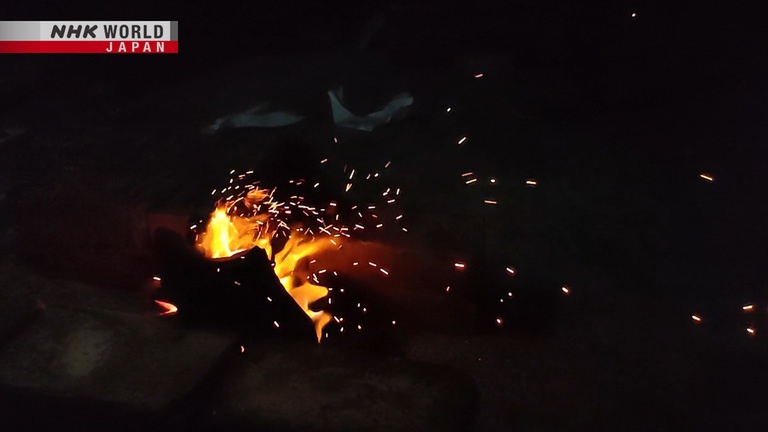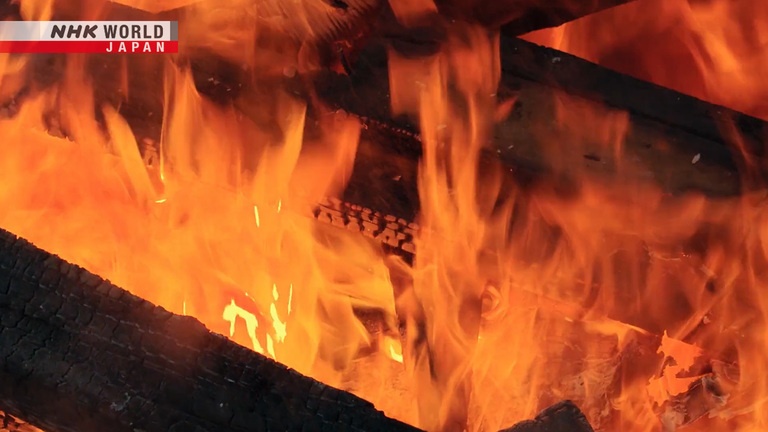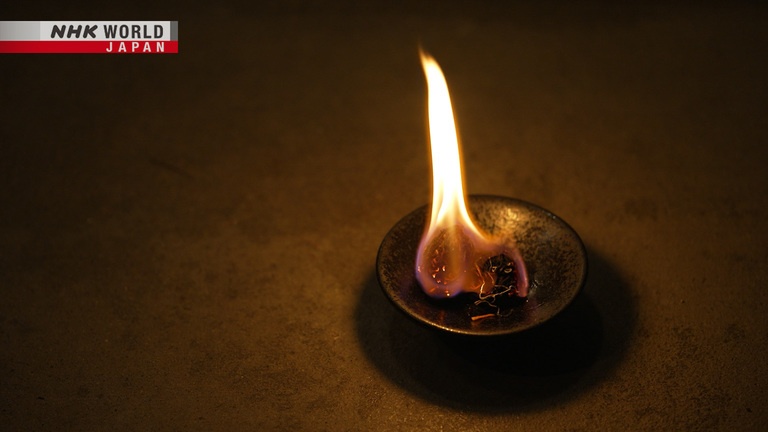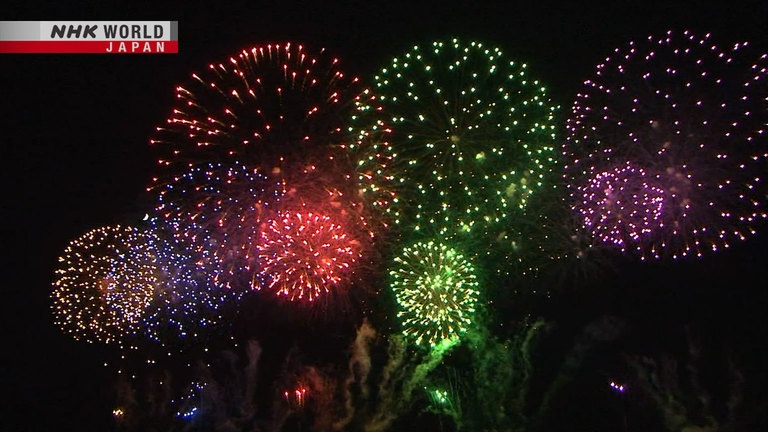Fire
The Japanese language is rich in words and expressions influenced by nature, history and culture. This episode looks at words related to fire. Fire has both practical and spiritual significance in cultures around the world, and Japan is no exception. This gave birth to many unique expressions. From his home in Kyoto Prefecture, poet and literary translator Peter MacMillan guides us through these words and the culture behind them.




Transcript
"Yukigesho."
"Karakurenai."
The Japanese language is rich in unique expressions that reflect nature and culture.
Magical Japanese.
Today's theme is "hi," or "fire."
Hello, I'm Peter MacMillan.
It is often said that the discovery of fire was the beginning of human civilization.
Fire which was useful cooking, heating, and lighting to make life comfortable and convenient
gave birth to many words in Japanese.
Let's have a look at some expressions in Japanese that involve "fire."
"yaruki ni hi ga tsuku."
"Yaruki" means motivation.
"Hi ga tsuku" means something has caught fire.
The phrase literally means someone's motivation has been ignited, and they are working full steam.
For example, parents might say about their child: He really needs to improve his grades!
If only "yaruki ni hi ga tsuku" - he'd get motivated!
"yaruki ni hi ga tsuku."
"yaruki ni hi ga tsuku."
"shiri ni hi ga tsuku."
It's used to describe an urgent situation where you're forced to act just as if your bottom is on fire!
In a business setting, for example, you might say: Now that the deadline's near, it's a "shiri ni hi ga tsuku" - urgent situation.
"shiri ni hi ga tsuku."
"shiri ni hi ga tsuku."
"tsume ni hi o tomosu."
"Tsume" is a fingernail, and "hi o tomosu" means to light a fire.
While setting fire to your fingernails is not a realistic way to save on candles, the phrase is used figuratively to describe an extremely stingy or frugal lifestyle.
He struggled financially from a young age.
I heard he used to lead a "tsume ni hi o tomosu" - very frugal-lifestyle.
"tsume ni hi o tomosu."
"tsume ni hi o tomosu."
An expression that involves lighting a part of your body on fire is interesting, don't you think?
Fire can also be disastrous.
In the Edo period between the 17th to 19th centuries, there were people who would put out big fires, like modern-day firefighters:
"hikeshi."
"Keshi" is derived from "kesu," meaning "to put out."
Whenever there was a fire, the "hikeshi" would run through town towards the site, shouting to warn people of the fire.
The "hikeshi," who fought fires face on, were revered by the townspeople.
Since there were no fire trucks back then, the most effective measure they could take was to destroy the houses near the fire
and prevent the fire from spreading.
The leader of the "hikeshi" brigade, wearing a showy outfit, would stand on the top of a roof, and supervise and cheer on those tearing down the joining houses.
They put their lives at stake!
And here are some expressions that came about from this.
"kajiba no bakajikara."
"Kajiba" means the scene of a fire.
"Baka" refers to something extreme or beyond reason, and "jikara" is derived from "chikara," meaning power.
The expression is used when someone displays extraordinary abilities during a desperate situation, such as in a fire.
A problem came up right before the deadline, but his idea saved the day.
He showed "kajiba no bakajikara" - amazing powers.
"kajiba no bakajikara."
"kajiba no bakajikara."
"rekka no gotoku."
"Rekka" is a raging fire.
The phrase is used to describe a person who's in a rage.
He was betrayed by a trusted friend, and was furious, "rekka no gotoku" - like a raging fire.
"rekka no gotoku."
"rekka no gotoku."
You definitely want to avoid somebody who is inflamed at you!
Now, let's look at some onomatopoeias that are used to describe the strength of a flame.
A campfire burns like this: "pachi pachi."
"pachi pachi."
A larger flame makes this sound: "bo bo."
"bo bo."
Fire is an important part of life.
It is also revered as something that has a special power in cultures around the world, and Japan is no exception.
Let's have a look at some of the types of fire worship in Japan.
"mukaebi."
"Hi" becomes "bi" when preceded by another word.
Here, it's combined with "mukae," meaning "to welcome."
In Japan, ancestral spirits are believed to briefly return every summer.
Traditionally, people prepare a welcoming "mukaebi" at their gates or doors, or near rivers, to greet them.
"okuribi."
When the time comes for the spirits to leave, people light an "okuribi" to see them off.
The fires are also said to guide the spirits on their journey.
In some regions, the "okuribi" is a large, ceremonial bonfire.
The most famous one is the "Kyoto okuribi," where fires in the shape of huge Chinese characters are lit on the side of a mountain.
There are six characters that are lit up.
Of these, the character for dai, which means "big," is the most well-known.
In coastal towns or towns with rivers, lanterns are floated on the water, due to the belief that the souls of the departed will float on the lanterns to the point they can enter the other world.
Very mystical, isn't it?
Here's another example of the Japanese attitude towards the souls of the departed.
"hanabi."
The origins of Japanese "hanabi" have not been confirmed, but it's believed Dutch or Portuguese ships brought them,
along with firearms, in the 16th century.
"Hanabi" spread to the general population in the Edo period, starting in the 17th century.
Largescale fireworks displays are said to date back to a festival held in the 1700s along the Sumida River in present-day Tokyo.
At that time, a major famine and epidemic had caused numerous deaths.
It's said that people set off "hanabi" to pray for the souls of the dead and to ward off evil spirits.
In many countries, fireworks displays are used to celebrate the new year or other events during the year, but in Japan they are mostly held in the summer.
I don't remember seeing fireworks displays as a child growing up in Ireland, so I was so amazed to see them when I first came to Japan.
Discovering that they were used to honor the dead made me understand the great passion and skill that went into making them so splendid.
"hanabi."
"hanabi."
Oh, the fireworks are starting!
See you next time.
Bye.